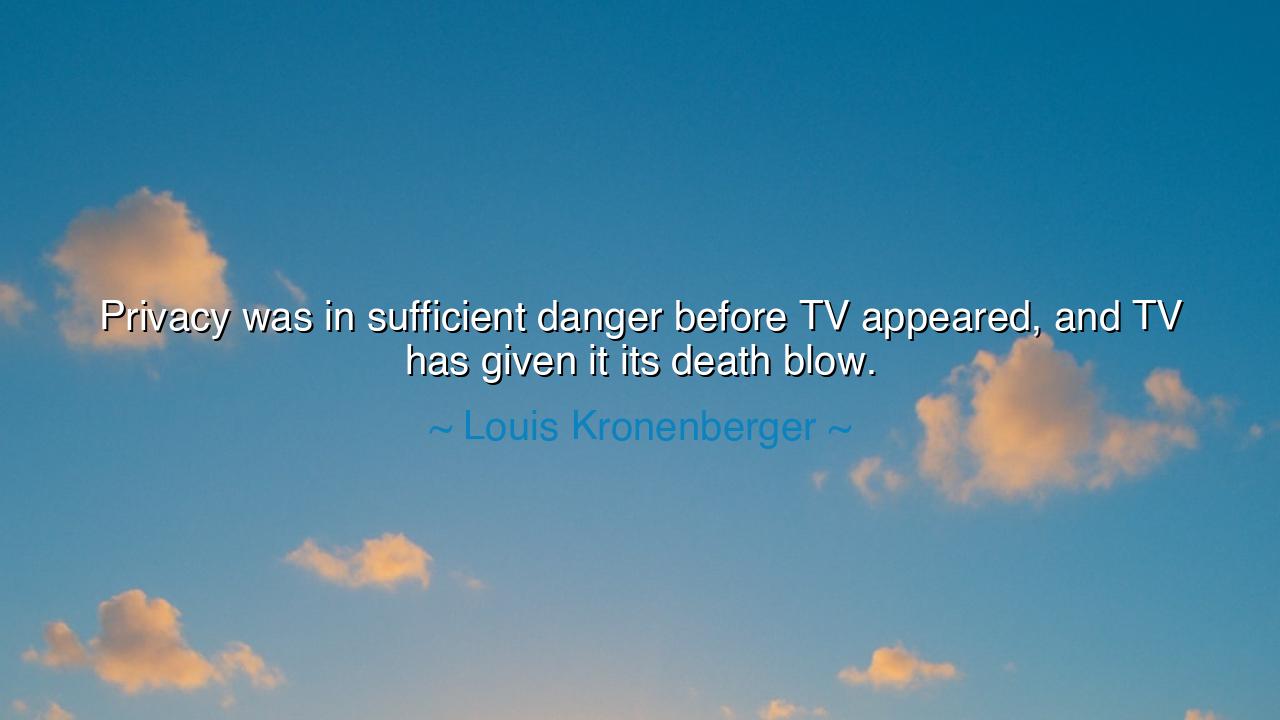
Privacy was in sufficient danger before TV appeared, and TV has
Privacy was in sufficient danger before TV appeared, and TV has given it its death blow.






The words of Louis Kronenberger — “Privacy was in sufficient danger before TV appeared, and TV has given it its death blow.” — resound like a prophecy spoken on the threshold between two ages: the age of solitude and the age of spectacle. In this single sentence, Kronenberger, a critic and essayist of sharp perception, foresaw the transformation of humanity’s inner life in the face of modern invention. Long before the rise of digital screens and the endless gaze of the internet, he saw that with the coming of television, the walls of the private world began to crumble. His warning was not only about technology, but about the soul’s vulnerability when the line between the public and the personal grows thin.
In the centuries before, the home was the fortress of privacy — a sacred place where a man could think, dream, and reflect unseen by the world. But even before television, this fortress was under siege. Industrialization had drawn the people from quiet villages into crowded cities; telegraphs and telephones began to pierce the silence of solitude; and the press, ever hungry for sensation, had learned to trade in the secrets of men’s lives. Kronenberger saw that modern civilization had already set its eyes upon the private soul, and that the invention of television would be the final breach — the moment when the home itself ceased to be wholly one’s own.
For when the television entered the living room, it brought the world with it — not the world of thought and reflection, but the world of spectacle and noise. It invited strangers, performers, and merchants of desire into the hearth where families once spoke in quiet communion. The people who once turned inward, who pondered, read, and prayed, now turned outward — their eyes fixed upon the glowing screen. Kronenberger’s “death blow” was not physical destruction, but spiritual transformation. It was the death of interior life, the end of that invisible realm where one could think privately, feel deeply, and be known only to oneself and to God.
History itself gives us countless examples of this vanishing privacy. Consider the fate of Princess Diana, whose every gesture was captured and consumed by cameras, her humanity devoured by the public’s insatiable gaze. Though she lived in palaces, she was never alone. The eye of technology followed her like a curse — until, in her death, the world mourned not only a woman, but the cost of exposure. Kronenberger’s warning echoes here: that when the boundary between the self and the world dissolves, when every private moment becomes a performance, authentic life itself begins to perish.
Yet the quote’s wisdom reaches far beyond television. If Kronenberger could see our age — where every soul carries a screen in its hand, where every meal, thought, and sorrow is shared with unseen audiences — he would know his prophecy fulfilled. The death of privacy he feared has indeed come to pass, and with it the weakening of reflection, mystery, and authenticity. For privacy is not merely the right to be unseen — it is the condition that makes true thought possible. Without the shelter of solitude, the soul becomes a mirror for others rather than a window to the divine.
And yet, my children, despair not. The wisdom of Kronenberger is not only warning, but invitation — to reclaim the sacred space of the self. Turn off the noise, if only for an hour. Guard your thoughts as treasures; do not give them too freely to the marketplace of attention. Let there be moments in your day untouched by screens, where silence can once again speak. For privacy is not dead if even one soul remembers to keep watch over it. It is a fire that must be rekindled by choice — by the courage to be unseen, to live inwardly, to seek not the world’s gaze but one’s own truth.
So take this lesson to heart: do not mistake exposure for connection, nor visibility for worth. The man who is constantly seen may soon forget who he is when alone. Preserve your inner life as the ancients preserved the flame in their temples — a light that burns unseen, yet gives meaning to all that is visible. For when you learn to dwell again within yourself, untouched by the clamor of the crowd, you will rediscover what Kronenberger sought to protect: the quiet nobility of being one’s own master, the unbroken strength of privacy, and the peace of a soul that belongs wholly to itself.






AAdministratorAdministrator
Welcome, honored guests. Please leave a comment, we will respond soon